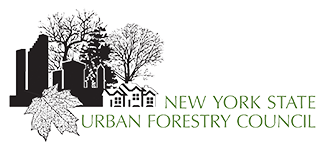At the 2019 NY ReLeaf Conference last July in Rochester, Dr. Leslie Brandt presented a fascinating talk about her work on urban forest adaptation to climate change, and she offered up powerful resources and tools to our community. Here’s a brief summary of those resources compiled by blog editor Michelle Sutton in consultation with Dr. Brandt.
Background
The Climate Change Response Framework (forestadapation.org) is a collaborative, cross-boundary approach among scientists, managers, and landowners to incorporate climate change considerations into natural resource management.
The Framework’s partners are numerous and wide-ranging, including the Bureau of Indian Affairs, National Park Service, U.S.D.A. Forest Service, U.S. Geological Survey, and dozens of state and local governments, Native American tribes and tribal organizations, universities, and ecological and urban forest institutes and organizations.
The Northern Institute of Applied Climate Science (NIACS) works with partners to lead Framework activities across the Midwest and Northeast U.S. Within the Climate Change Response Framework, the Urban Forestry focus addresses urban forest vulnerability for cities and creates tools to help local managers adapt to the effects of climate change.
This urban forest-centered effort is coordinated by Dr. Leslie Brandt, who serves as climate change coordinator for the Eastern Region of the U.S. Forest Service and is a climate change specialist with NIACS.
Tools
Dr. Brandt’s primary focus over the past five years has been developing and testing a framework for adapting urban forests to climate change. Her work, piloted in Chicago, has now expanded to other urban areas across the Midwest and Northeast. Among her professional interests are frameworks for assessing vulnerability and adaptive capacity.
Here’s what urban forest professionals in New York–and throughout the Midwest and Northeast regions of the U.S.–should know about the resources and tools available at forestadaptation.org:
The site provides an Adaptation Workbook that can be printed out or worked through online. City Forestry programs that have already availed themselves of the Workbook—and whose implementation, referred to as Adaptation Demonstrations, are on the Workbook website—include Cambridge, Massachusetts; Columbia, Missouri; and New York City.
An online, free training for using the Adaptation Workbook is coming in Winter 2020. Called the Forest Adaptation Planning and Practices (APP) training, this is a proven in-person NIACS course that has helped natural resource managers throughout the eastern United States prepare for and adapt to climate change. Now the same program is available as a seven-week online course using this online tool. Through this course, participants will be able to:
- Identify climate change impacts that pose the greatest challenges and opportunities for their project area or ecosystem
- Describe whether and how management may need to be adjusted in light of climate change
- Develop specific actions to help ecosystems adapt to changing conditions, and connect action plans with broader climate adaptation concepts and strategies
- Use the Adaptation Workbook to create their own “climate-informed” project plan
- Better communicate with stakeholders on key climate change vulnerabilities relevant to their region
- Access support from NIACS during project planning and implementation
Understanding and evaluating the climate change impacts for a particular region or system is an important first step in adapting to climate change. It’s key information that informs the process of using the Adaptation Workbook to strategize natural resource management. The climate change impact data on the above-linked site is meticulously sourced and cited.
Comprehensive Climate Change Adaptation resources featured in the Adaptation Workbook can be found here and can be filtered by region, sector, and subject.




